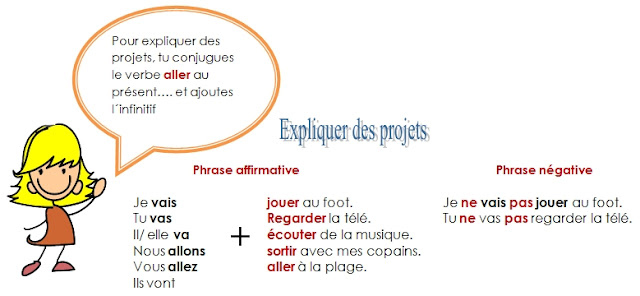
Avec la Conjugaison du Monde. Indicatif, conditionnel ou subjonctif, apprenez à conjuguer le verbe parler avec la Conjugaison du Monde. Toutes les déclinaisons de la conjugaison du verbe parler sont sur Le Monde. The French near future— futur proche —is a verb construction that is used to express something that is going to happen soon, an upcoming event that will occur in the near future.
I’m going to speak French. Unsubscribe from French Cultural Institute of Seville? On peut parler de l’avenir avec le futur proche et le futur simple. Ces deux temps ont des similitudes mais aussi des différences.
Il n’est pas toujours facile de voir la différence entre ces deux temps. It follows the most common conjugation pattern in the French language, so learning how to conjugate it is relatively easy. Voilà pourquoi il ne figure pas dans la liste des conjugaisons. Emploi Le futur simple est une projection dans le futur.
La conjugaison du verbe parler sa définition et ses synonymes. Conjuguer le verbe parler à indicatif, subjonctif, impératif, infinitif, conditionnel, participe, gérondif. Par exemple… L’avion va atterrir dans minutes. The near future is used to express when you are going to do something (not will, that is the regular future tense). Do not confuse it with going to a location.
You will know it is the futur proche if there is a form of the verb aller (to go) in the present tense, followed directly by an infinitive. Similarly to English, the verb aller (to go) can be used as an auxiliary verb to create a near-future tense (le futur proche). Just make sure you have memorized the present tense conjugation of ALLER. I’ll use parler again for an example: I am going to speak: Je vais parler. Search the definition and the translation in context for “parler”, with examples of use extracted from real-life communication.

Est-ce que tu vas faire une promenade demain? Les étudiants vont étudier ce soir? Parler de ses goûts - Duration:. Lesson A - Le futur proche - Duration: 7:18. LEARN FRENCH WITH VINCENT 142views.
Ils vont parler du projet. Le futur simple versus le futur proche : En général le futur simple est utilisé pour faire des projets ou des prévisions dans l’avenir. Je répondrai à vos questions la semaine prochaine.
Nous suivrons le protocole tel que convenu. Tandis que le futur proche , indique un futur plus ou moins immédiat. A French verb in le futur simple needs two things: a base (sometimes called a stem or a root) and an ending. For the bases, we’ll start by looking at the three classes of regular verbs in French. For –er and –ir verbs, all you do is use the infinitive form of the verb, so you can just leave it in the –er or –ir form.
The near future tense (le futur proche ) is used to express something that will be happening in the very near future, and is formed by conjugating the verb aller (to go) into the present tense and pairing it with the infinitive verb. Níže si ale jeho tvorbu vysvětlíme podrobněji. Budoucí čas se tvoří koncovkami -ai, -as, -a, -ons, -ez, -ont.

K jejich zapamatování může pomoct, že v jednotném čísle a 3. Das Futur composé, auch Futur proche genannt, verwenden wir für Handlungen in der nahen Zukunft. Die Betonung liegt darauf, dass bereits eine Absicht besteht und die Handlung in Kürze stattfinden wird. De FUTUR PROCHE , in het Nederlands de nabije toekomst, is een werkwoordtijd.
Het drukt iets uit dat zo dadelijk of straks gaat gebeuren, net iets minder ver weg is dan de gewone toekomende tijd (le futur simple), die verder weg ligt in de toekomst.
Geen opmerkingen:
Een reactie posten
Opmerking: Alleen leden van deze blog kunnen een reactie posten.